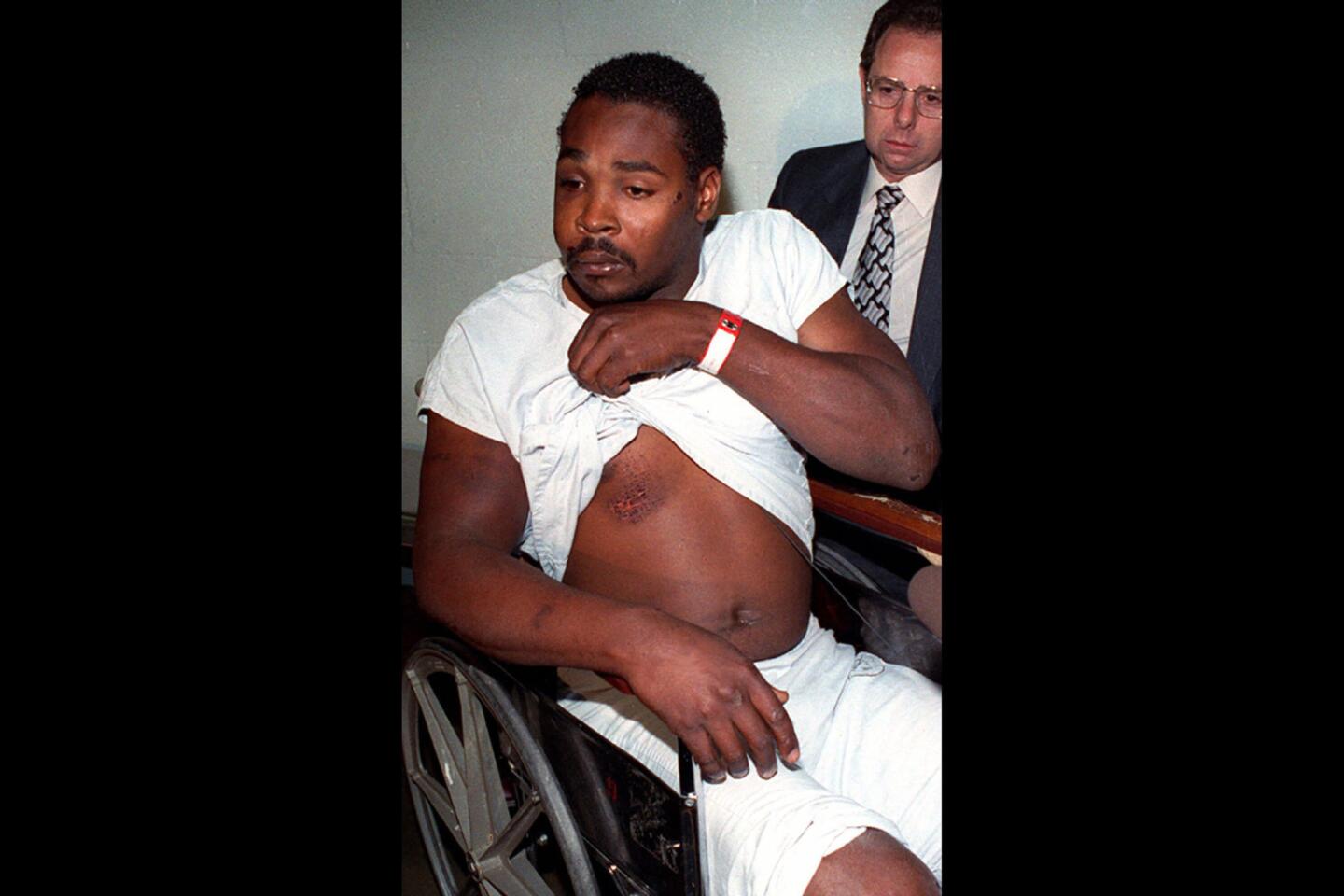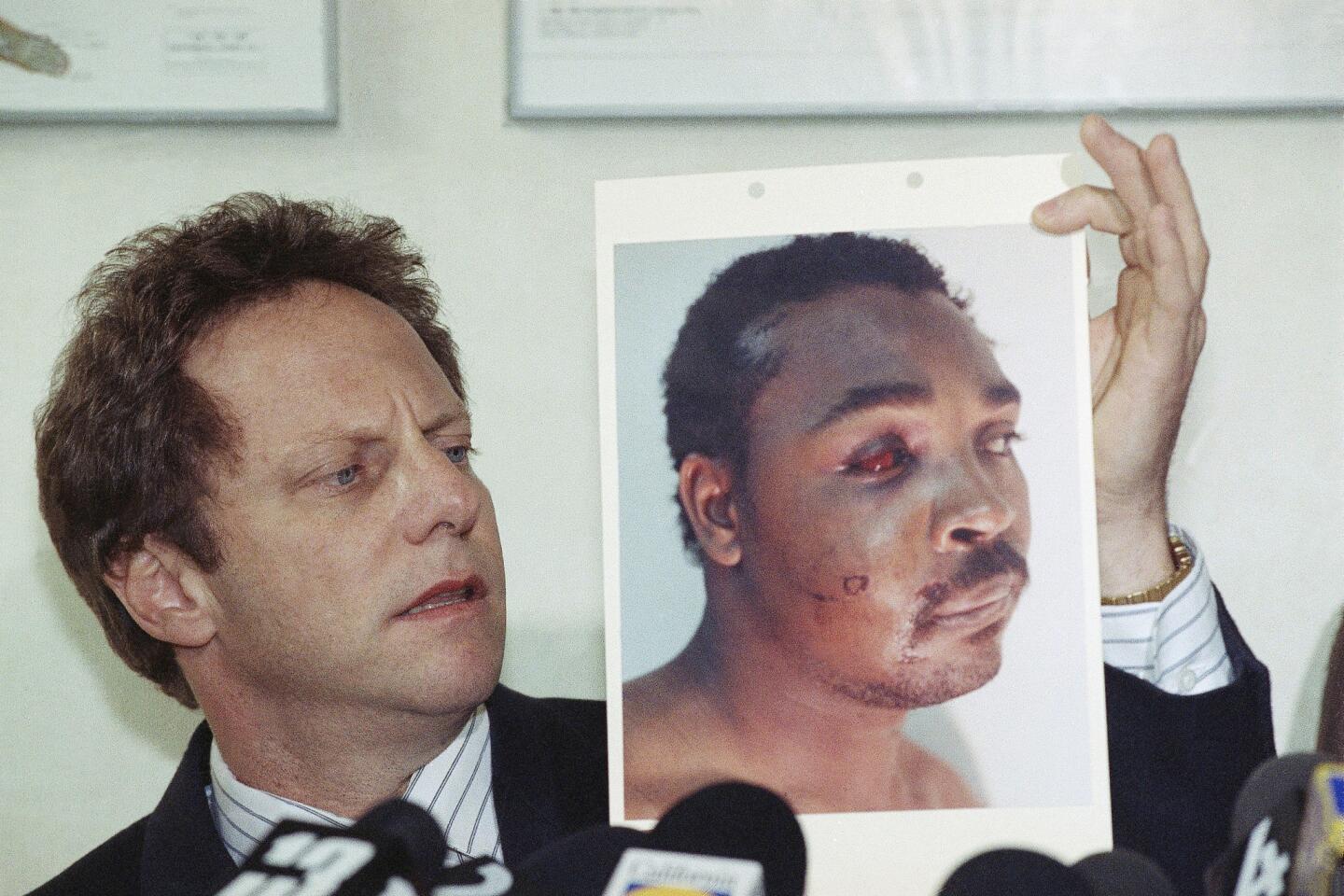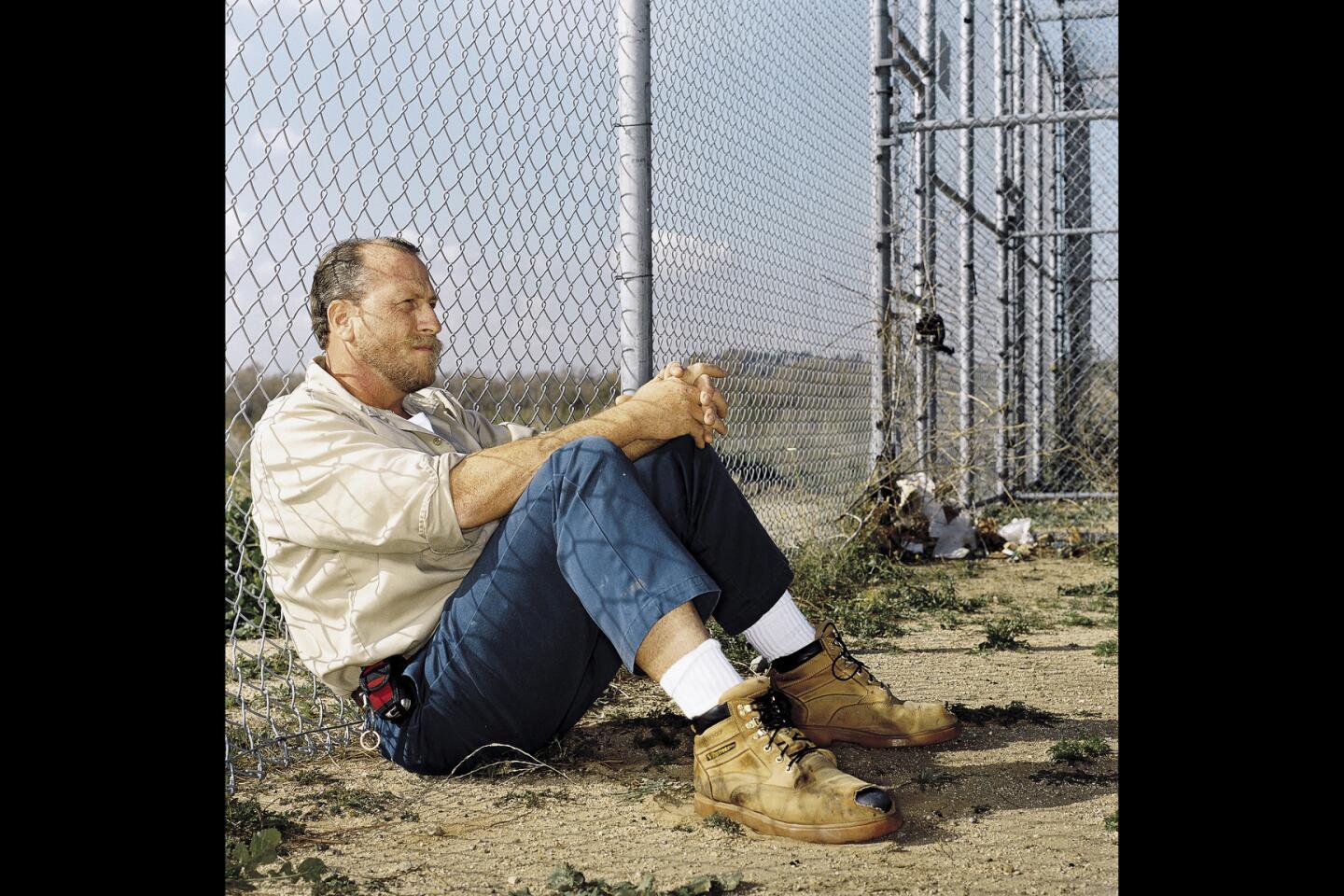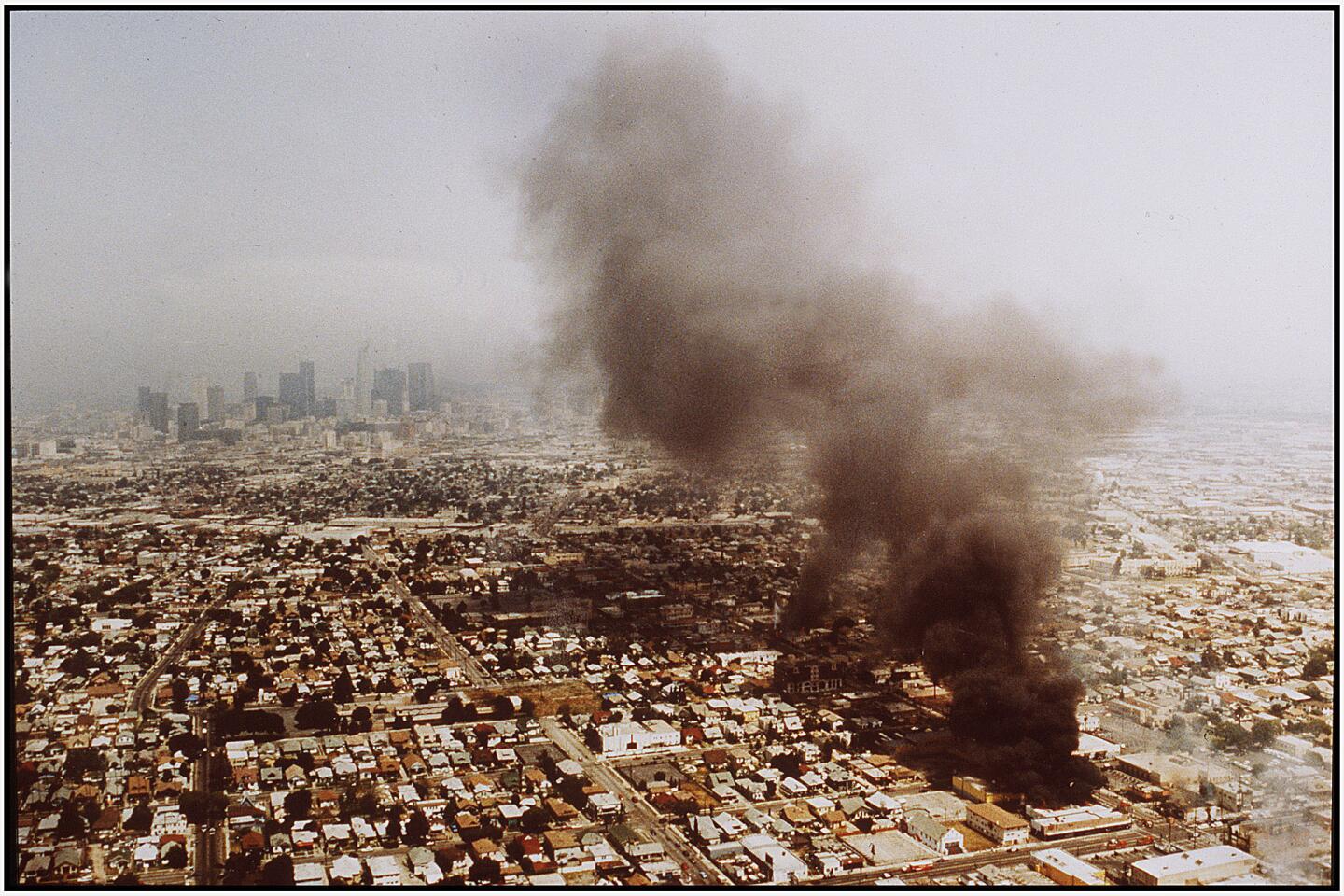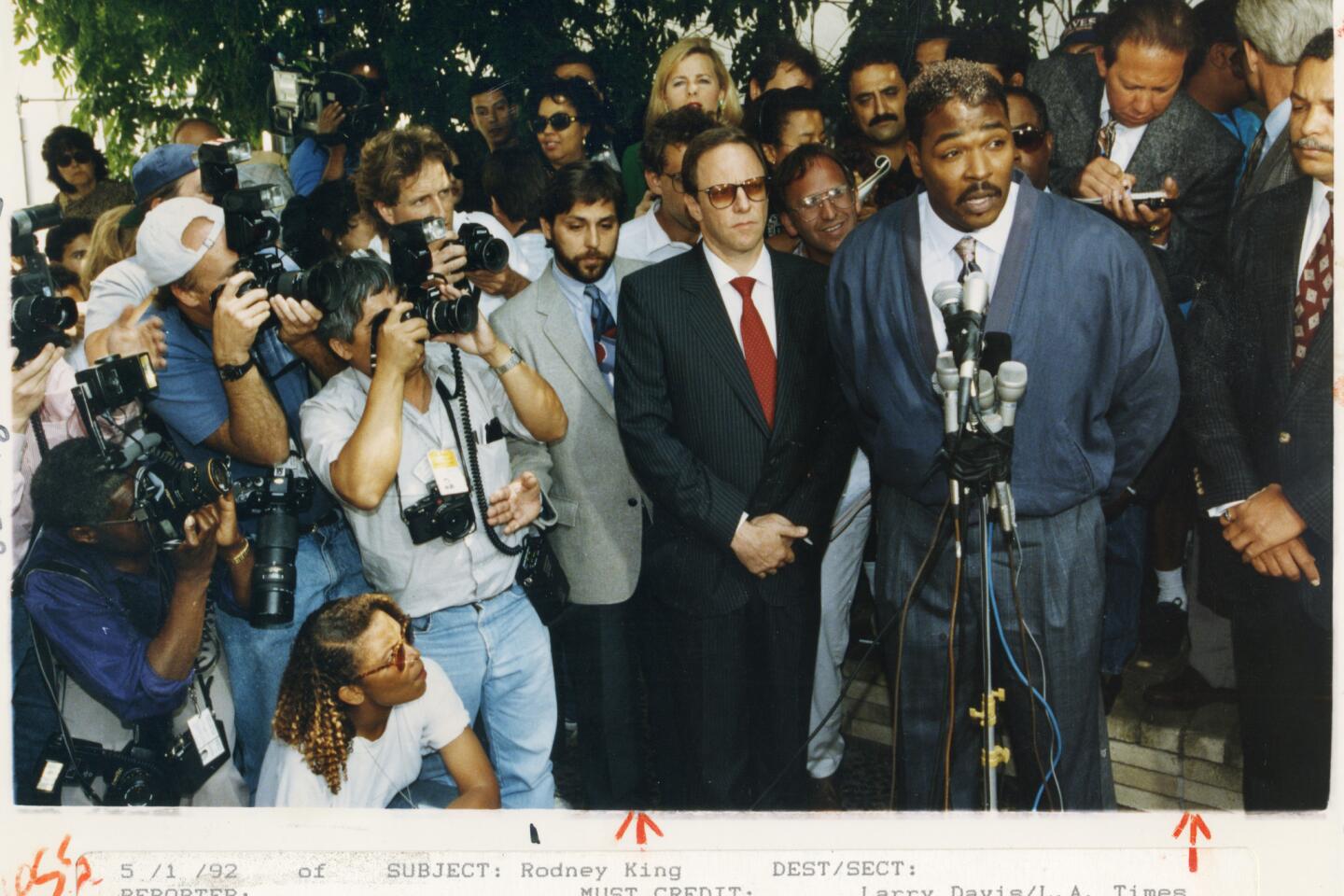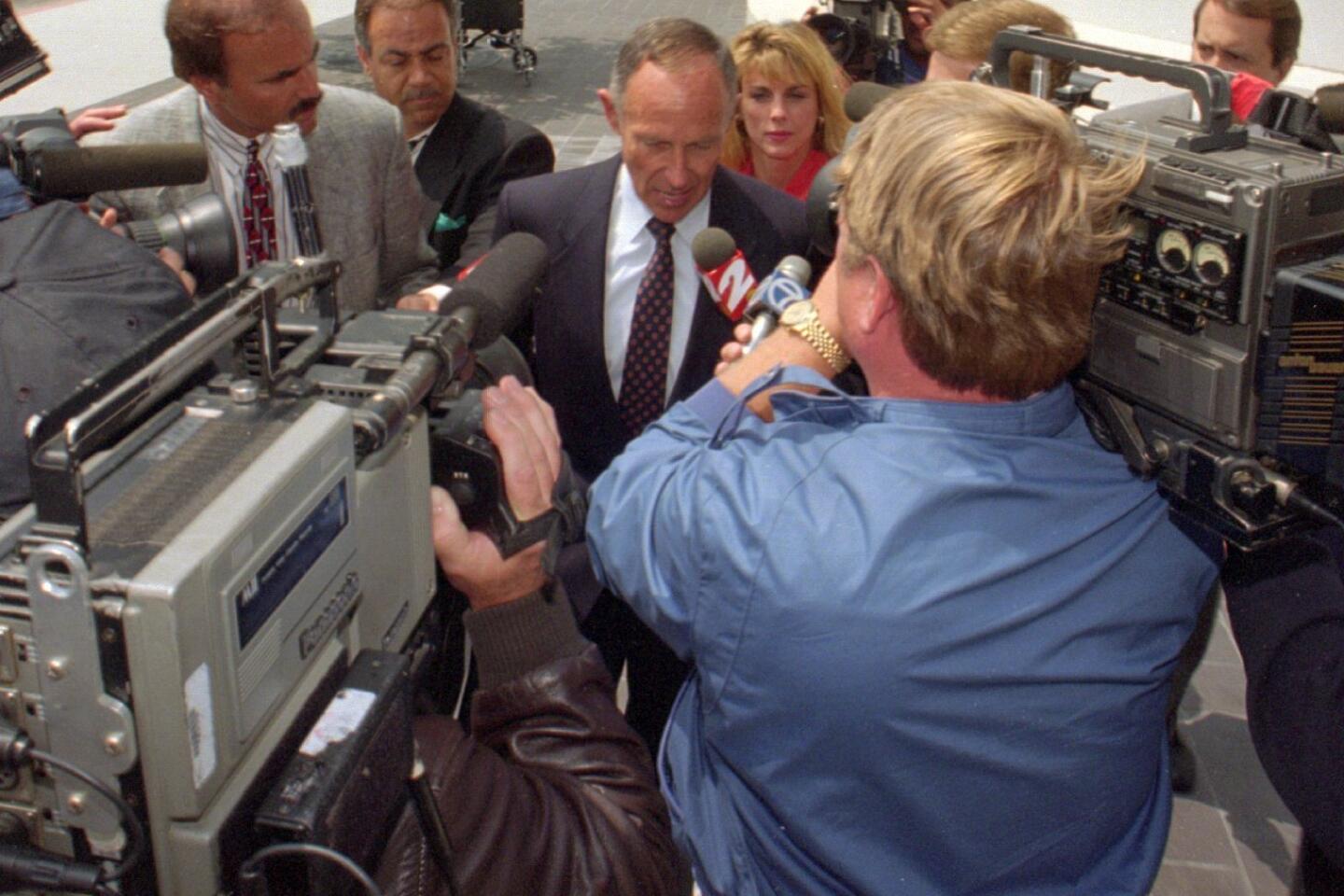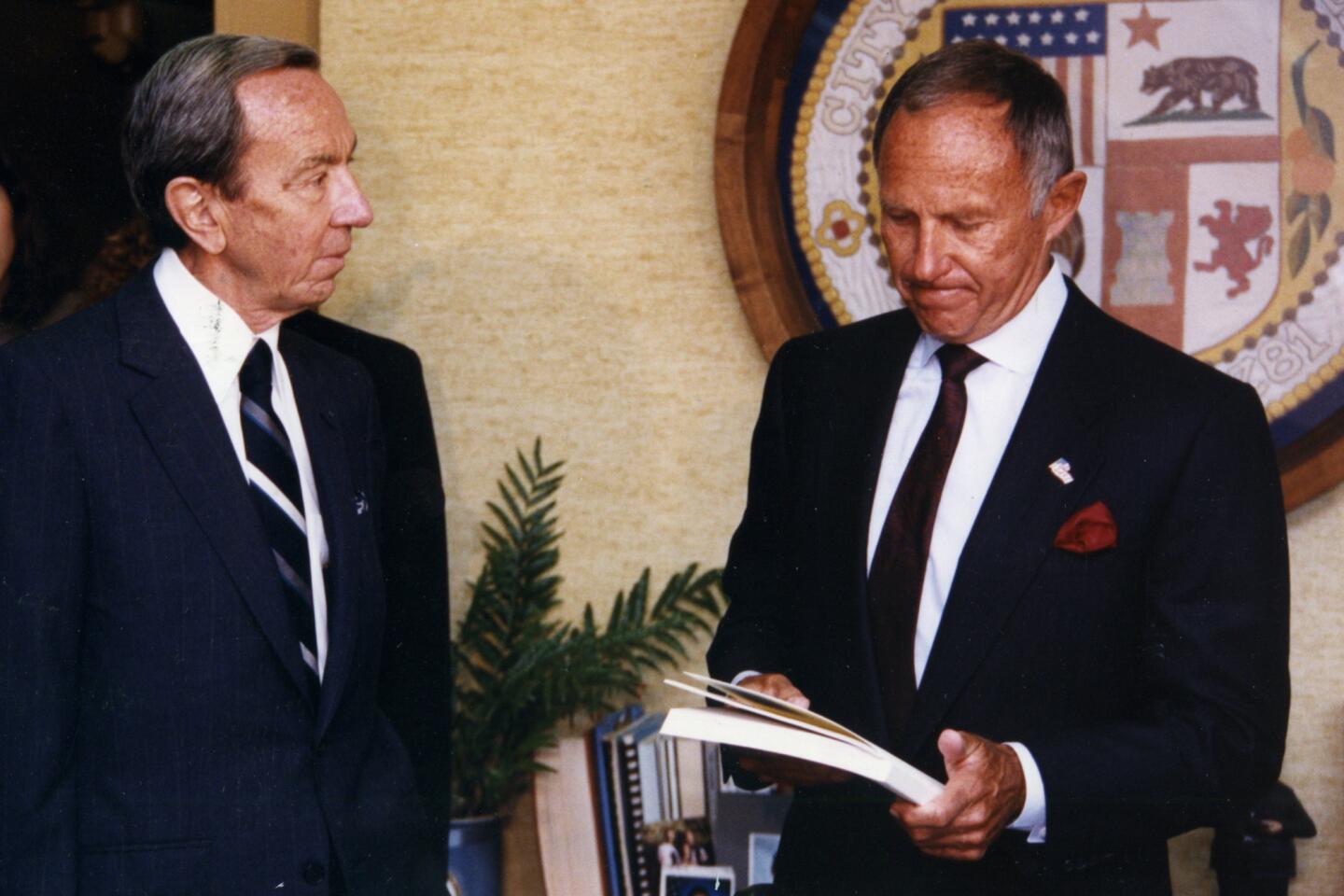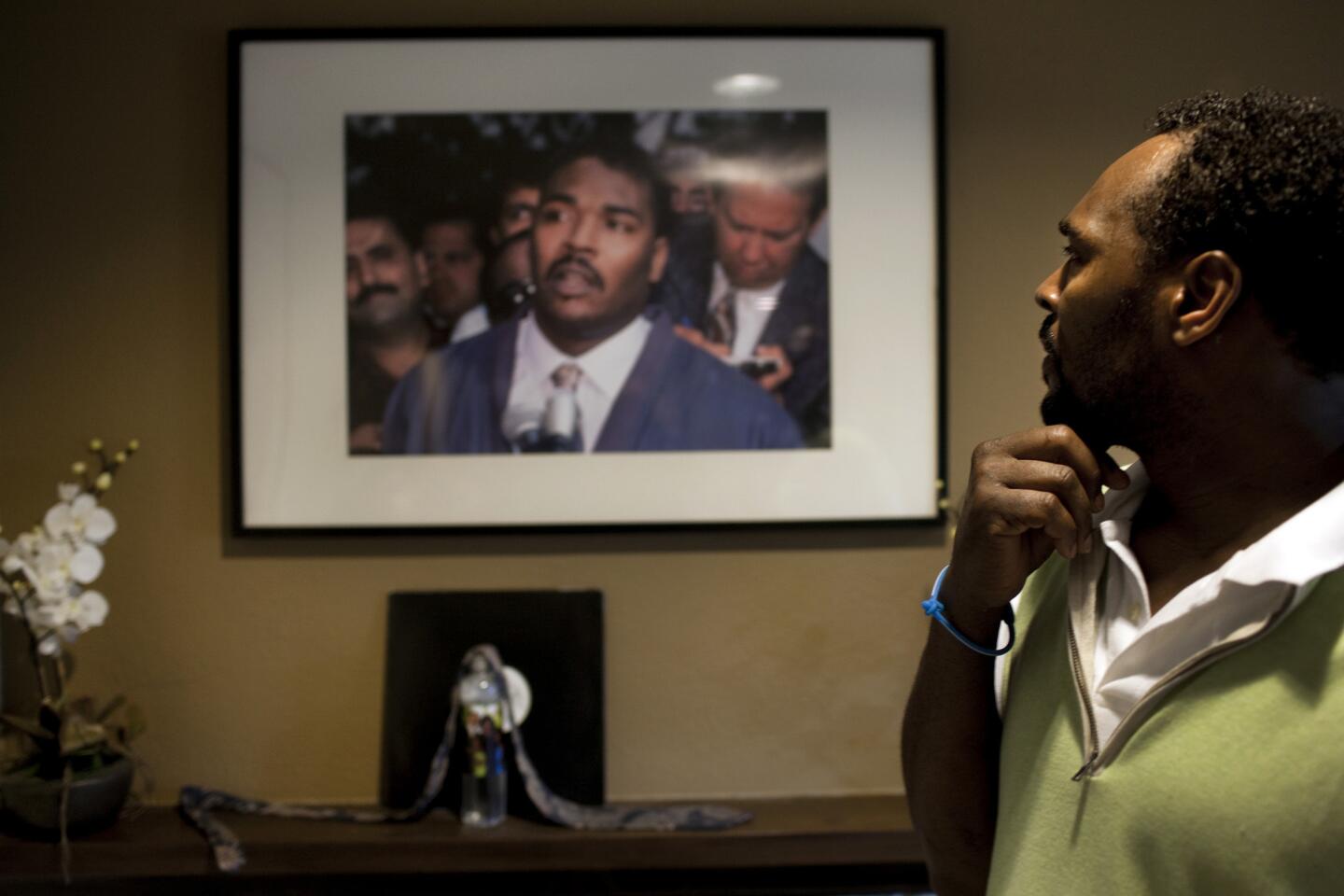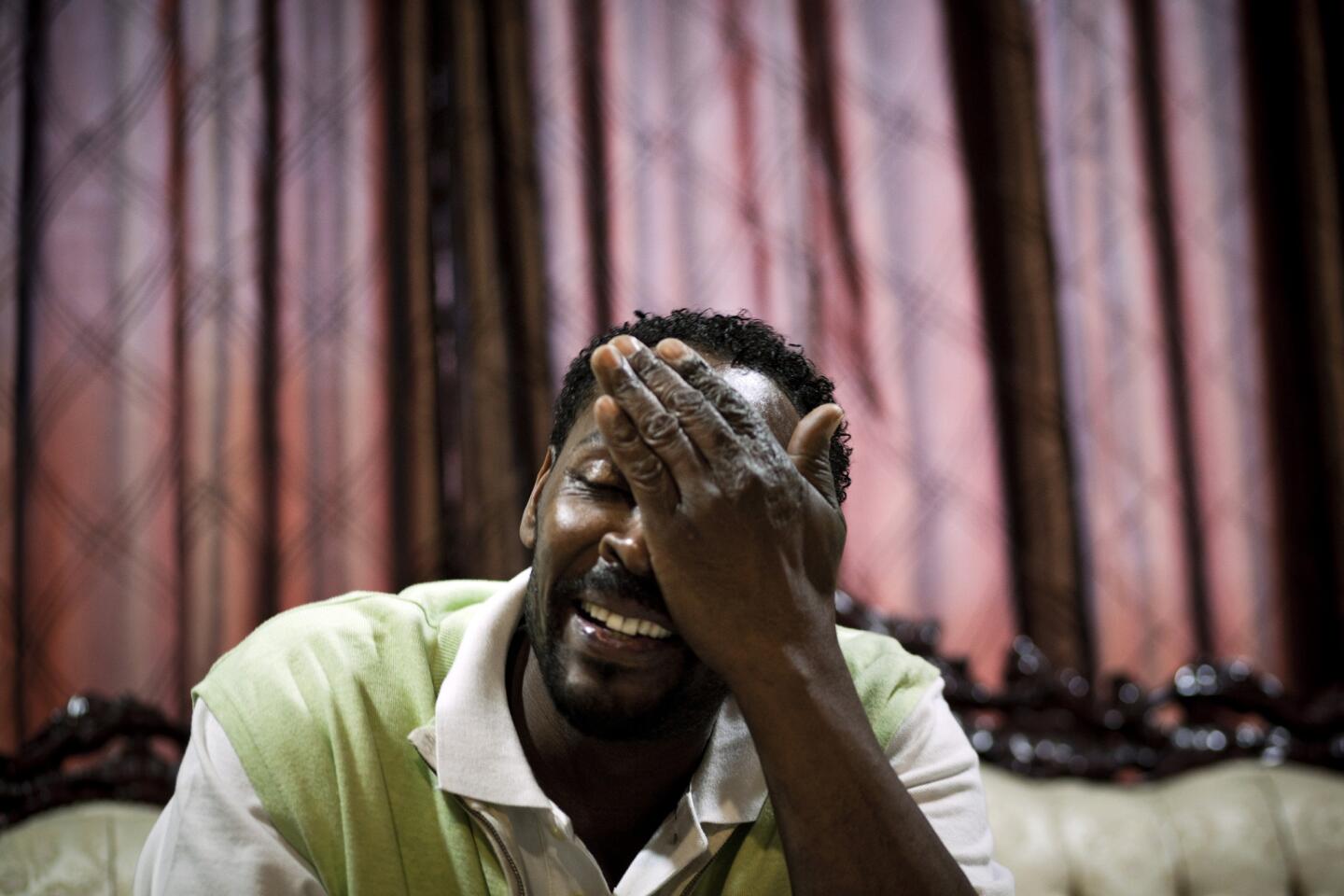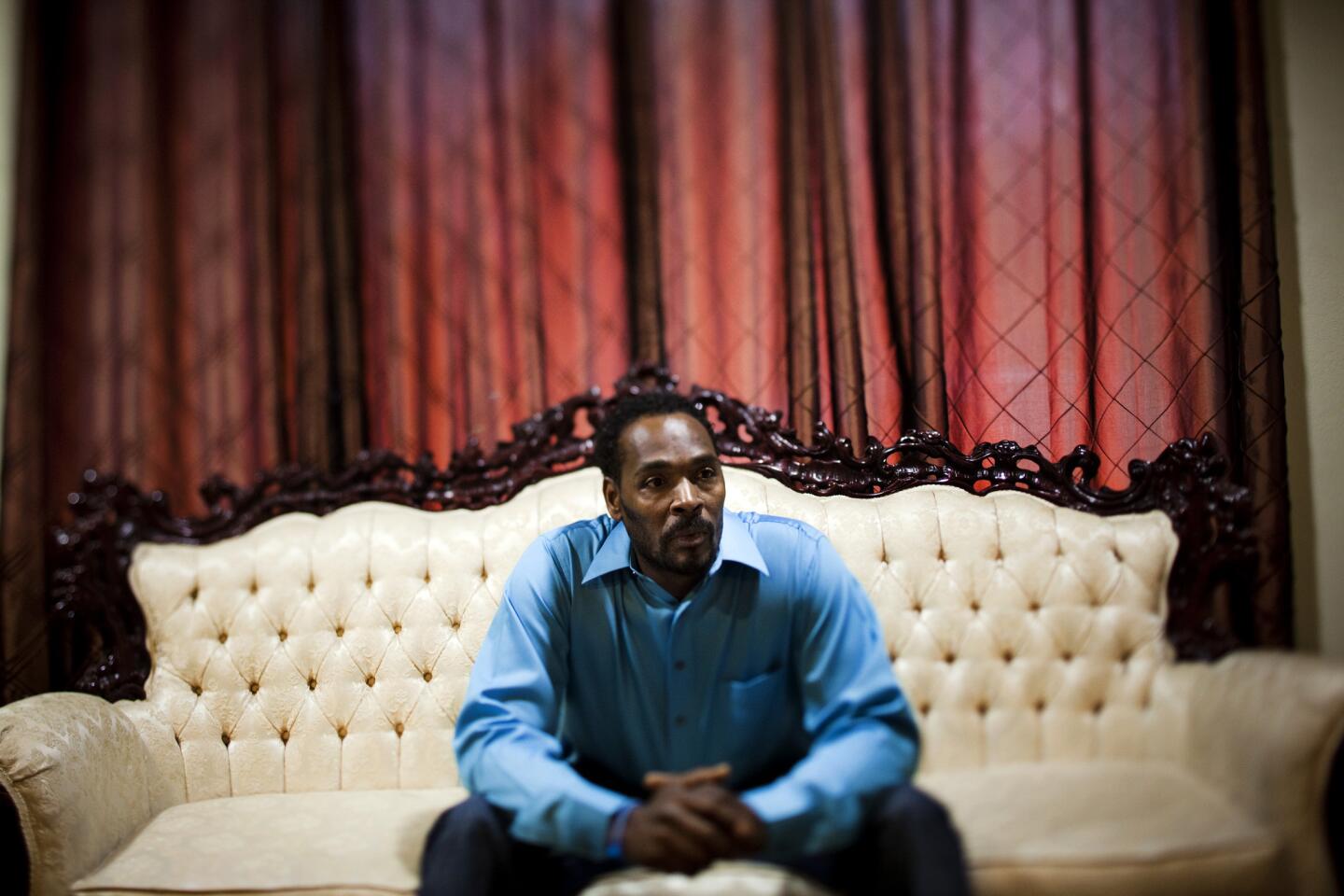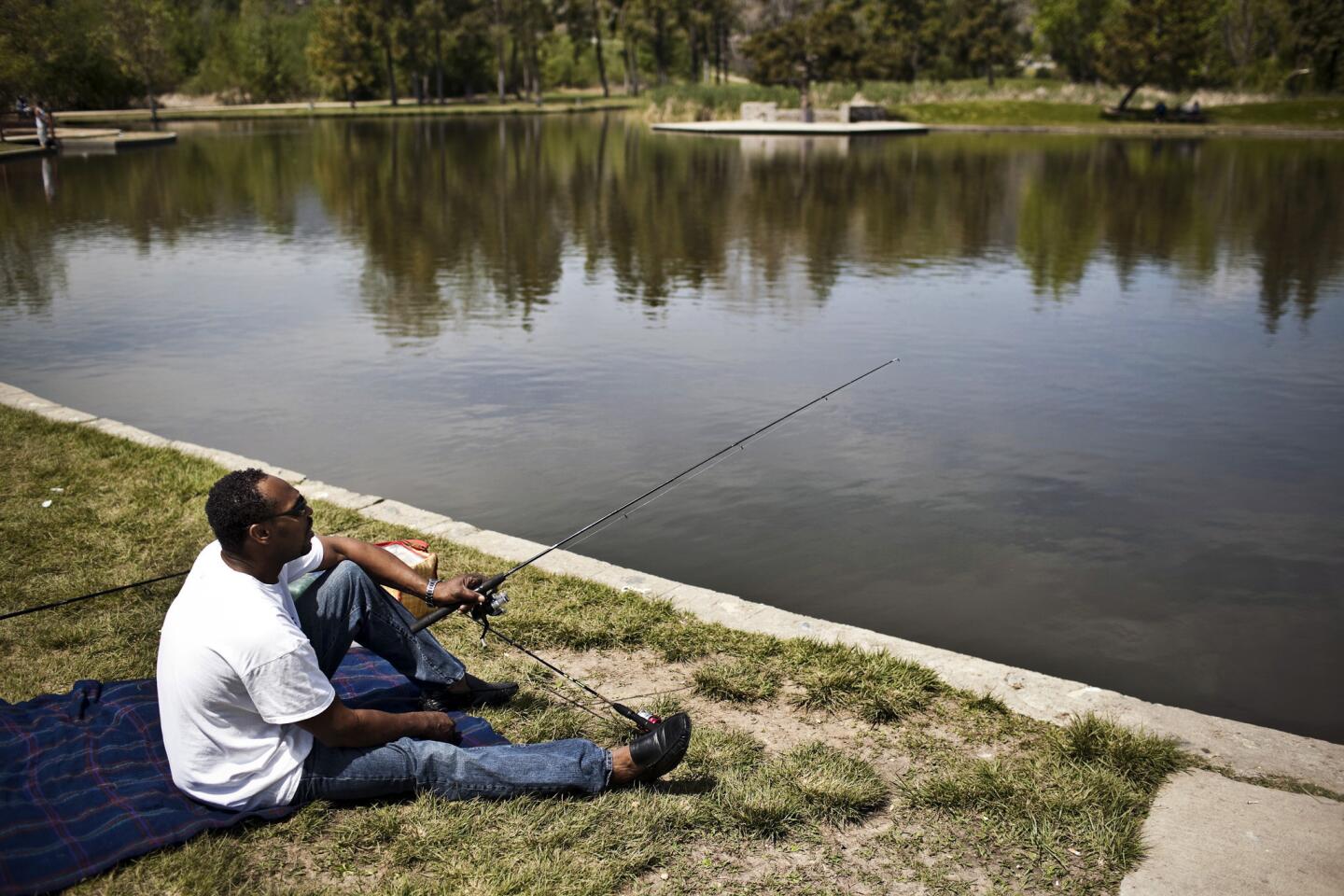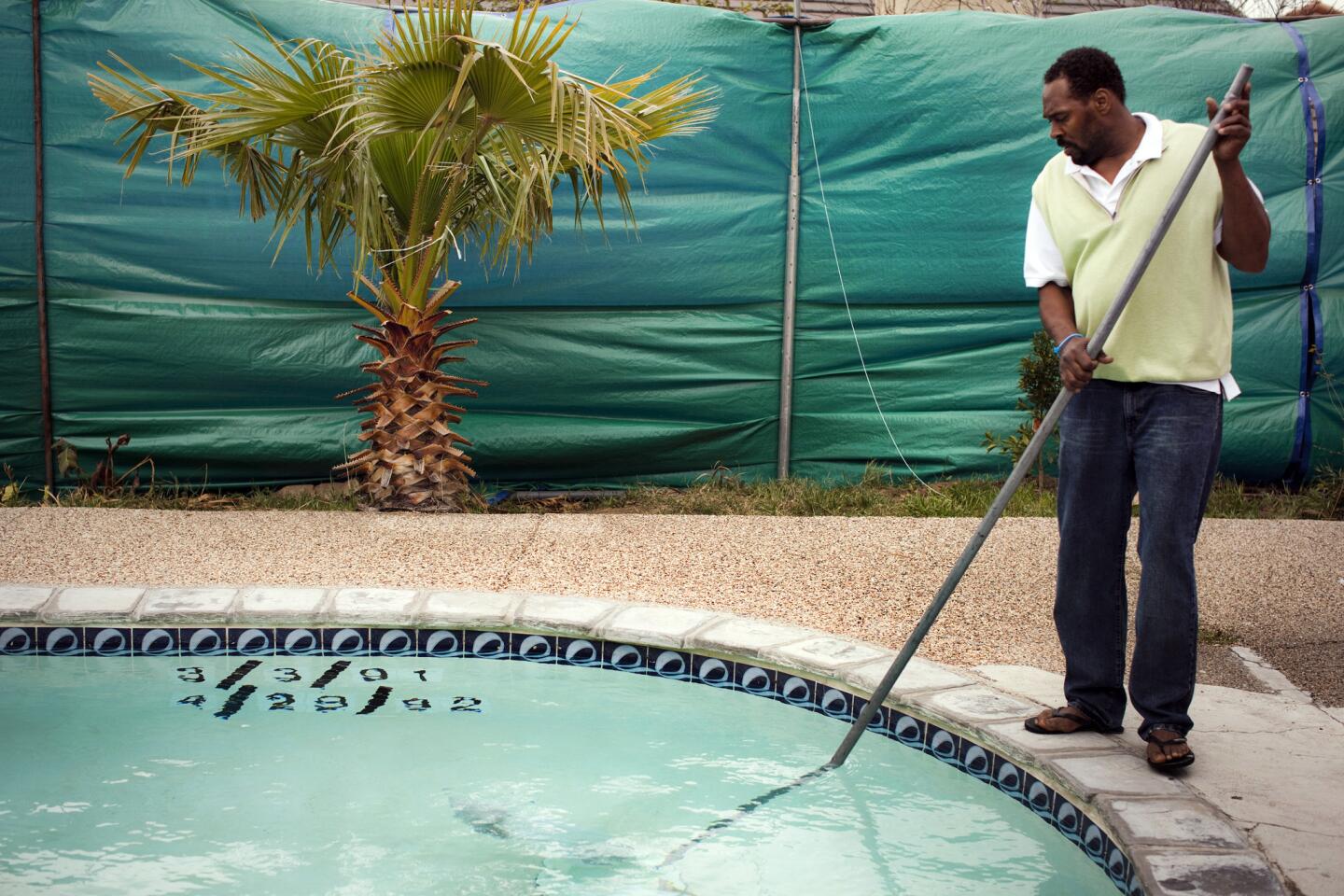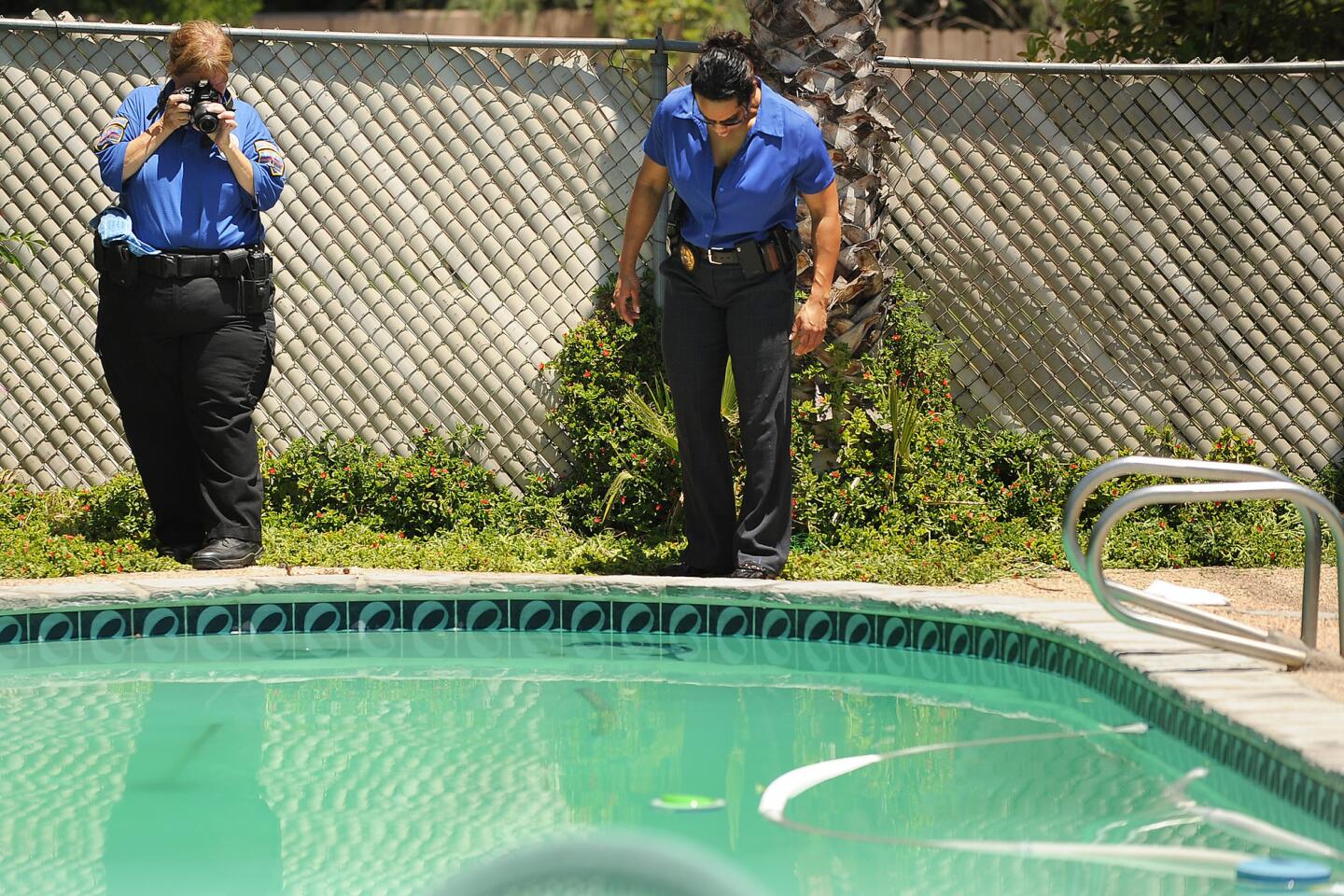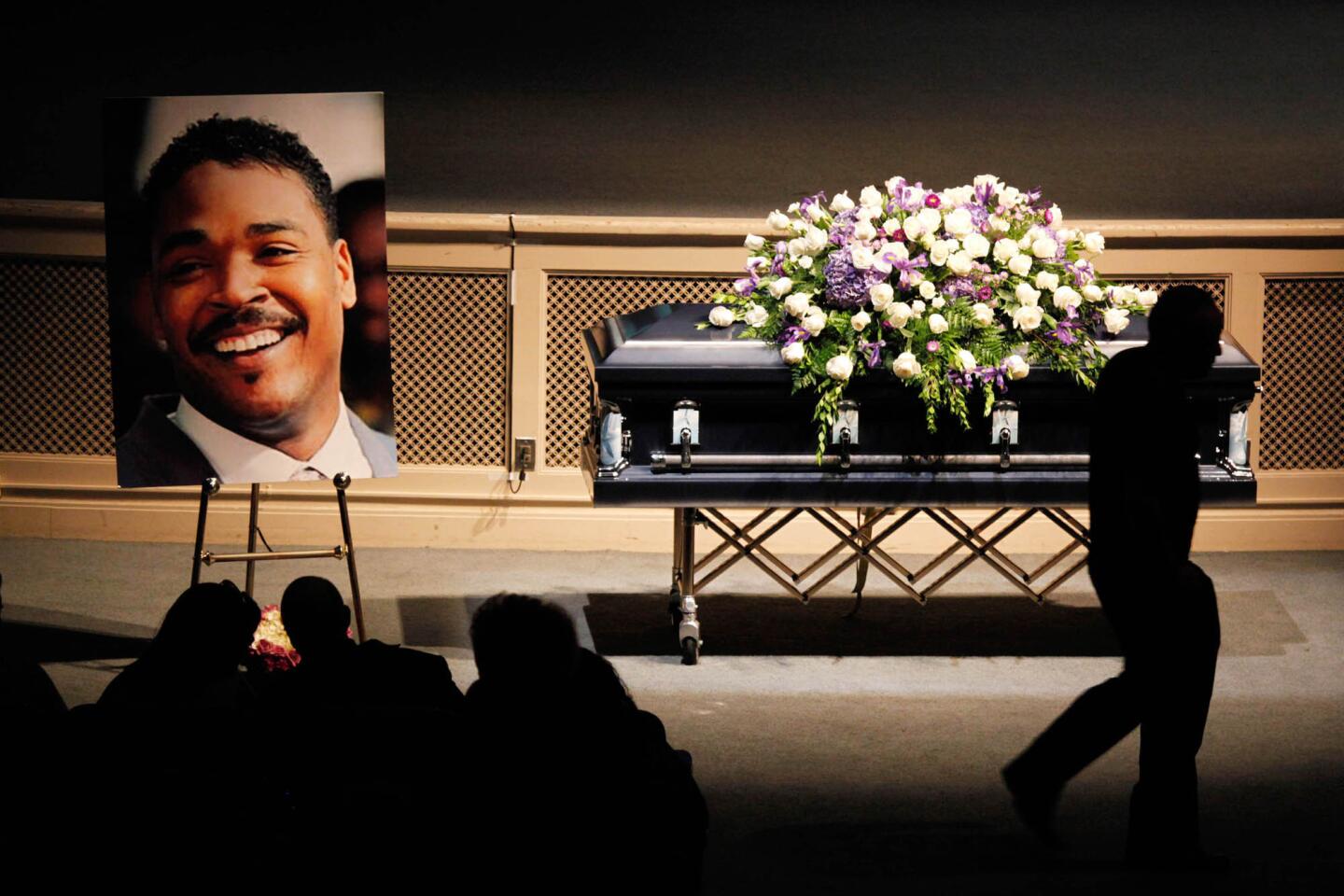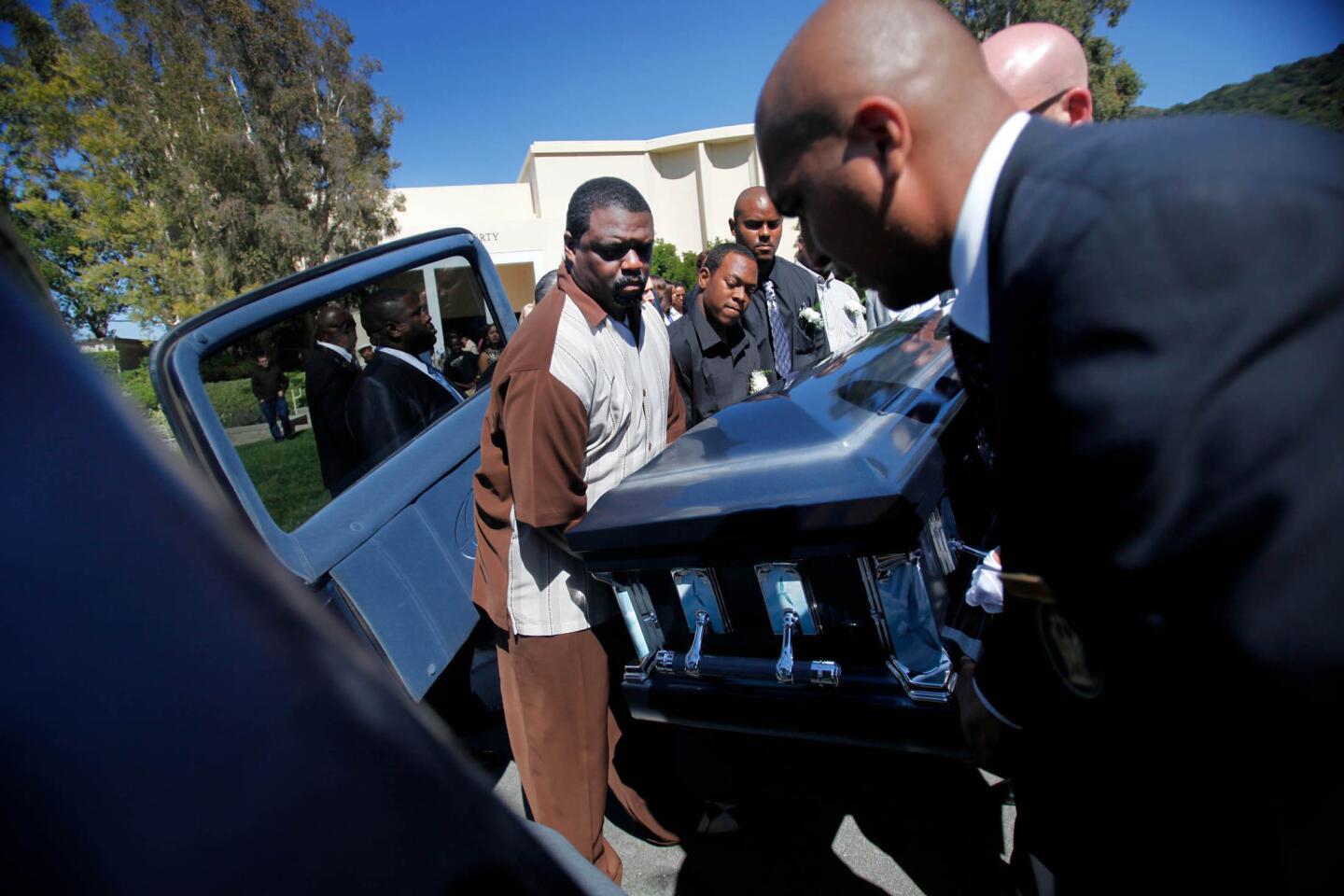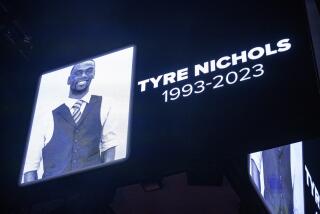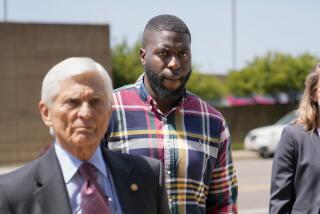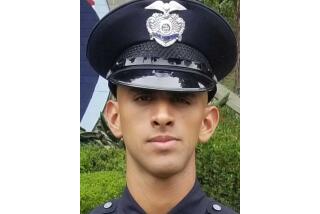From the Archives: Federal jury finds that Stacey Koon and Laurence Powell violated beating victim’s civil rights
an extraordinary early morning conclusion to one of the most volatile criminal trials in U.S. history, a federal jury returned guilty verdicts Saturday against two Los Angeles police officers for violating Rodney G. King’s civil rights during an infamous 1991 arrest.
Sgt. Stacey C. Koon--a coolly confident police officer who has rarely shown any hint of emotion through two criminal trials--sat stoically as the clerk to U.S. District Judge John G. Davies read the guilty verdict against him. As he listened, Laurence M. Powell, the officer who delivered most of the blows, went pale and licked his lips.
Powell’s lawyer, Michael P. Stone, turned to him and whispered: “We’re going down, bud.”
Within seconds, that was borne out as Powell, too, was convicted. Later, the normally articulate Stone groped for words during an interview, fighting to overcome his emotions: “I was stunned,” he said. “I just felt like, I just can’t believe it. I can’t believe 12 people could convict Larry.”
The panel--a racially mixed eight-man, four-woman group sequestered since Feb. 25 in the downtown Los Angeles Hilton hotel--completed its work against the backdrop of a city churning with Angst and anticipation.
Although Powell and Koon were convicted, the jury acquitted two other officers for their role in the March 3, 1991, arrest and beating. Prosecutors presented less evidence against Theodore J. Briseno and Timothy E. Wind, but even though they were acquitted, they, too, left the courtroom badly rattled by the convictions of their two colleagues. Briseno cried, his lawyer said.
Koon and Powell face maximum sentences of 10 years in prison and fines up to $250,000 each, but federal sentencing guidelines suggest that they would not be likely to receive such severe penalties.
The verdicts ended a federal investigation that began two days after the incident and just hours after a videotape of the beating was first broadcast on television--igniting what defense attorney Harland W. Braun on Saturday called a “prairie fire across the country and the world.”
Almost exactly one year ago, a state court jury returned not guilty verdicts against the same officers, and those verdicts touched off rioting that left at least 52 people dead in Los Angeles. On Saturday, news of the federal convictions had the opposite effect: Spontaneous celebrations broke out in South-Central Los Angeles and relief wafted through much of the city.
“Now it’s time to just jump and shout for a few minutes before we go back to work,” the Rev. Cecil L. (Chip) Murray said at his church, First African Methodist Episcopal, in the West Adams district. “Today we celebrate, tomorrow starts to be more pragmatic.”
Elsewhere:
* In some areas where looting and burning raged a year ago, a few people peacefully picketed with placards, some leaped into the air and cheered, and others planned barbecues and parties to celebrate what they regarded as justice. Many rose early to listen to the verdicts. “I woke up this morning and my mom was clapping when she was watching TV,” said Kevis Manuel of Long Beach. “The two who did the most damage got what was coming.”
* Thousands of police officers and federal agents took up positions across the city before dawn Saturday to brace for the worst, but by midmorning the fear of a crisis had passed. “I think the men and women of Los Angeles should go about their daily lives,” Police Chief Willie L. Williams said at morning news conference. “If the sun comes out, get in the pool.”
* Judge Davies ordered Powell and Koon to appear in his court for sentencing Aug. 4. In the meantime, they are expected to appeal their convictions. Koon’s lawyer, Ira Salzman, dejectedly addressed reporters after the verdicts, and said that one likely ground for such an appeal will be Davies’ decision to allow jurors in the federal trial to hear videotaped testimony that Briseno gave during the state case.
* The judge told the still-anonymous jurors that they could speak publicly about the case that has consumed their lives for more than seven weeks. One came forward and said the fear of riots was never expressed in the jury room. The verdicts, he said, turned on the amateur videotape of the King beating.
‘Justice Has Been Done’
A host of local, state and national leaders hailed the verdicts, praised the prosecution team and called on people to emerge with new confidence from a controversy that has gripped Los Angeles and the nation for more than two years.
In Pittsburgh, Pa., President Clinton said the case should strengthen the nation’s commitment to putting more police officers on the street and redouble its dedication to certain values.
“Surely the lasting legacy of the Rodney King trial ought to be that: a determination to reaffirm our common humanity and to make a strength of our diversity,” Clinton said. “If we can do that we can get on about the business of this great land.”
Gov. Pete Wilson said: “Justice has been done, whether or not people agree or disagree with the verdict.”
Mayor Tom Bradley said he did not have all the evidence that the jury saw, but he called the trial’s outcome a “fair and just result.”
The verdicts also pitted some familiar adversaries against one another. Former Police Chief Daryl F. Gates--blamed by many for a tardy police response to last year’s riots--held a morning news conference in which he referred to the federal case as a “politically correct trial” and said he was amazed by the jubilation over the verdicts. Gates’ old nemesis, Bradley, responded later with a biting shot of his own.
“I want you to understand this,” Bradley snapped at a reporter who asked about the former chief, “Daryl Gates is irrelevant to this issue, to this city at this moment. Any other questions?”
At the Edward R. Roybal Federal Building, where the trial was held and where demonstrators gathered in growing numbers as the jury deliberated, a few protesters were on hand Saturday morning. Some were dissatisfied with the verdicts, complaining that all four officers should have been convicted. But others hugged in celebration and cheered.
The Prosecutors
U.S. Atty. Gen. Janet Reno had prepared two statements--one in case the officers were acquitted and another to be delivered if there were convictions. James Turner, the acting chief of the Justice Department’s Civil Rights Division, read the latter on Reno’s behalf.
“The jury has spoken, and justice has prevailed,” Reno said. “The Department of Justice will continue to bring prosecutions to ensure that the civil rights of all citizens here in Los Angeles and across the country are protected.”
From the start, legal analysts had said the civil rights case against the officers would be a difficult one, largely because of what Davies called the “high and heavy burden” of proving that the officers not only used unreasonable force but also did so with the intent to deprive King of his constitutional rights.
In his statement, U.S. Atty. Terree A. Bowers commended the prosecutors who tried the case--Barry F. Kowalski, Steven D. Clymer, Alan Tieger and Lawrence Middleton--calling the group “one of the most formidable prosecution teams ever assembled.”
Clymer and Kowalski accepted the compliments modestly, but their enthusiasm was evident. They hugged briefly at one point, and Kowalski, one of the most experienced civil rights prosecutors in the nation, stressed that the prosecution team was acutely conscious of the weighty task they had undertaken.
“A year ago the conscience of the community, the conscience of the nation, cried out for justice,” Kowalski said. “This verdict provides justice.”
Each of the prosecutors emphasized that the verdicts were not an indictment of law enforcement, and Bowers stressed that point with particular care.
“It must be emphasized that this case is about four police officers, not a police department or law enforcement officers in general,” Bowers said. “It is unfortunate that we have to pursue cases against law enforcement officers who are sworn to uphold the law. However, in pursuing cases such as this one, we vindicate the professionalism, courage and dedication of those officers who abide by the law and serve their communities well.”
A Night That Made History
Saturday’s verdicts represent the final major chapter in the most volatile police brutality case in history, one that began mundanely just after midnight on March 3, 1991.
Accompanied by two passengers, King was driving in a white Hyundai that night when the California Highway Patrol tried to pull him over for speeding. King was drunk and on parole, and he fled, leading the CHP, and eventually officers from the Los Angeles Police Department and the Los Angeles Unified School District, on a chase that ended on a dark street in Lake View Terrace.
While the police officers beat and arrested King, an amateur cameraman, George Holliday, started videotaping the events from his apartment across the street. Excerpts of that videotape would be aired around the world.
It was the tape, more than anything, that turned the beating into a national symbol for police brutality.
“To the casual viewer, it appeared that the police officers were methodically, systematically brutalizing a helpless, innocent black man who lay prone on the ground,” Koon wrote in his book about the affair. “The picture of unjustified police brutality is untrue, grotesquely so.”
But while Koon vigorously defended his actions and those of the officers under his supervision, the beating sparked state and federal investigations almost as soon as the videotape hit the airwaves.
The state investigation proceeded first, and the officers went on trial in early 1991 in state court. That trial lasted three months, and its finale stunned many Los Angeles residents who had assumed that convictions were a forgone conclusion.
The not guilty verdicts on all but one count--the state jury deadlocked on one charge facing Powell--were announced late in the afternoon of April 29, 1992. Within hours of those verdicts, Los Angeles was engulfed in violence that eventually would claim at least 52 lives and cause more than $1 billion in property damage.
Within a month, a federal grand jury was at work.
Making of the Federal Case
Charlie J. Parsons, the special agent in charge of the FBI’s Los Angeles field division, said that up to 17 agents worked on the case at a single time, an extraordinary commitment of staff to a single investigation.
On Aug. 5, with media from around the world crammed into a briefing room in the downtown federal courthouse, U.S. Atty. Lourdes Baird announced that all four officers had been indicted by a federal grand jury.
“The defendants are charged with stomping, kicking and beating Mr. King,” Baird announced. “It was an unreasonable use of force.”
After months of pretrial wrangling, jury selection opened Feb. 3, --the first official day of the federal trial. More than 6,000 Southern Californians received summonses to appear on the jury, but only 333 said they could afford to be sequestered for up to eight weeks, and dozens more were eliminated because lawyers were not convinced that they could be impartial.
The racially mixed panel that was selected--two African-Americans and one Latino were among the 12 jurors--was sequestered Feb. 25, shutting them off from the anxiety that grew in Los Angeles as the trial got under way.
During their case, prosecutors called 35 witnesses, most notably a police sergeant who testified about the limits that the LAPD places on officers who use force and a doctor who told jurors that the injuries to King’s head were the result of baton blows, not falls to the ground. And in the trial’s emotional climax, King took the stand, testifying in public for the first time about the beating.
“I was just trying to stay alive, sir,” King said. “They never gave me a chance to stay still.”
Lawyers for the officers responded chiefly by presenting evidence that the officers had been confronted with a violent, defiant suspect who had never been searched for a weapon. The defense’s chief expert on the use of force, Sgt. Charles L. Duke Jr., defended each and every baton blow on the videotape.
And Sgt. Koon took the stand for himself and for the other defendants. In sometimes brutal language, Koon took full responsibility for the force used to subdue King.
“My intent was to cripple Rodney King,” Koon said. “That is a better option than having to use deadly force, having to choke or having to shoot Rodney King.”
Finally, after six weeks of testimony and arguments, the case concluded on the Saturday between Good Friday and Easter. The jury began its deliberations that afternoon, and spent the next seven days weighing the evidence in a locked jury room on the eighth floor of the Roybal building.
The Final Days
While the jurors talked, a manic and sometimes bizarre atmosphere developed outside. Koon and his lawyer arrived for court one day wearing comic Groucho Marx nose-and-glasses disguises. A juror got sick, and there was momentary panic in the ranks of the international press staking out the building in hopes of a news flash. The judge broke a tooth. The Ku Klux Klan demonstrated.
But when the panel finally reached verdicts, it did so quietly, slipping a note to Davies to let him know that the process was over.
“Yesterday afternoon at 3:35 p.m. the court received a note from the jury,” Davies announced at the beginning of Saturday’s morning session. “This note reads as follows: ‘The jury has reached a unanimous verdict.’ ”
From the bench, Davies acknowledged what many had suspected all along: that he had agreed to provide law enforcement officials with advance notice when verdicts were reached. Between the time he received the note Friday afternoon and the opening of the verdicts at 7:06 a.m. Saturday, a representative of the court quietly contacted law enforcement agencies, informing them that verdicts were expected the next morning.
Chief Williams said he received word Friday afternoon, and other law enforcement officials said they were notified as well.
“We certainly appreciated the court’s consideration,” Parsons of the FBI said after the verdicts were announced. “We had gone into our first phase of readiness when the case went to the jury. The notice allowed us to go to the second phase.”
Word of the impending verdicts leaked out, however, at least in part because Police Commission member Stanley K. Sheinbaum publicly discussed it with several news organizations.
On Saturday, Sheinbaum came under fire from a number of insiders, including Bradley--who has long considered Sheinbaum one of his closest advisers.
Bradley called the commissioner’s comments uninformed and irresponsible, and added: “I’ll be talking to Mr. Sheinbaum about this matter on a personal and private basis.”
As the trial concluded, Davies profusely thanked jurors for their service, noting that they had made great sacrifices by agreeing to be largely cut off from the world while the case was argued. Davies reminded jurors that their names would be kept anonymous by the court, but said they could speak out about the case if they wanted.
By day’s end, at least two jurors had come forward, one speaking to KNBC-TV, Channel 4. That juror, who was not identified, said he was shocked to see the massive law enforcement presence as he and his colleagues were transported to the courthouse on the final day of their historic service. He said jurors had not considered the testimony by expert witnesses on the use of force as being particularly persuasive.
The juror said Koon appeared to be most culpable, while Briseno was at the opposite end of the spectrum--”a very excellent cop” who had done “everything that was humanly possible” to stop the beating.
Ultimately, the juror said, the case came down to one piece of evidence--the same one that millions of people have seen for themselves.
“I think the tape basically speaks for itself,” the juror said. “I would have to say that’s basically what convicted them.”
The Outcome
The jury’s decisions on the four defendants in the Rodney G. King civil rights trial and what lies ahead:
Stacey C. Koon
Verdict: Guilty
Next Step: Koon is set for sentencing Aug. 4. He is likely to appeal the conviction. He also faces an LAPD board of rights hearing.
*
Laurence M. Powell
Verdict: Guilty
Next Step: Powell is also scheduled to be sentenced Aug. 4. Meanwhile, he will file an appeal challenging the conviction. He also faces an LAPD board of rights hearing.
*
Timothy E. Wind
Verdict: Not guilty
Next Step: A rookie at the time of the incident, Wind is the only defendant who has been fired from the LAPD. He will not face further prosecution, but he will not return to the department.
*
Theodore J. Briseno
Verdict: Not guilty
Next Step: Briseno faces an LAPD board of rights hearing. Like Koon and Powell, he could apply for back pay if he is cleared of departmental wrongdoing.
More to Read
Sign up for Essential California
The most important California stories and recommendations in your inbox every morning.
You may occasionally receive promotional content from the Los Angeles Times.
